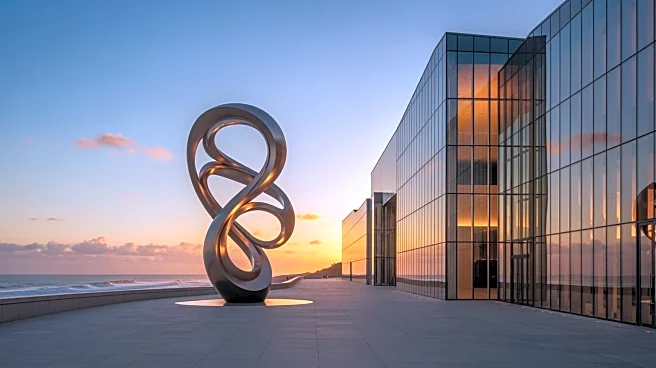What's Happening?
Cristiano Ronaldo, one of the most celebrated soccer players in history, is honored with a museum dedicated to his career on the Portuguese island of Madeira. The CR7 Museum, located in Funchal, showcases
Ronaldo's numerous trophies, including Premier League titles, Champions League trophies, and his Ballon d'Or awards. The museum also features artwork, sculptures, and handwritten letters from children worldwide, expressing admiration for Ronaldo. Despite its extensive collection, the museum offers limited insight into Ronaldo's personal life and the challenges he overcame, such as his upbringing in poverty and family struggles.
Why It's Important?
The CR7 Museum serves as a testament to Ronaldo's impact on soccer and his status as a global icon. It highlights the commercial and cultural significance of sports figures in shaping tourism and local economies. Madeira's dedication to Ronaldo, including naming the airport after him, underscores the influence of celebrity on regional identity and pride. The museum attracts fans and tourists, boosting local businesses and reinforcing Ronaldo's legacy as a source of inspiration for aspiring athletes worldwide.
What's Next?
The museum's focus on Ronaldo's achievements suggests ongoing efforts to preserve and promote his legacy. As Ronaldo continues his career, the museum may expand its collection to include future accolades and milestones. Additionally, the museum could enhance its narrative by incorporating more personal stories and insights into Ronaldo's life, offering visitors a deeper understanding of the man behind the athlete. This could attract a broader audience and further solidify Ronaldo's influence on sports and culture.
Beyond the Headlines
The museum's portrayal of Ronaldo raises questions about the balance between celebrating achievements and acknowledging personal struggles. By omitting details of Ronaldo's challenging upbringing, the museum may miss an opportunity to inspire visitors with a more comprehensive story of resilience and determination. This highlights the broader cultural tendency to focus on success while overlooking the complexities of personal journeys.











